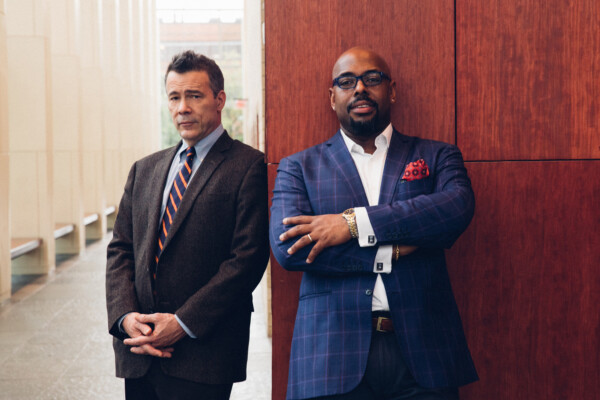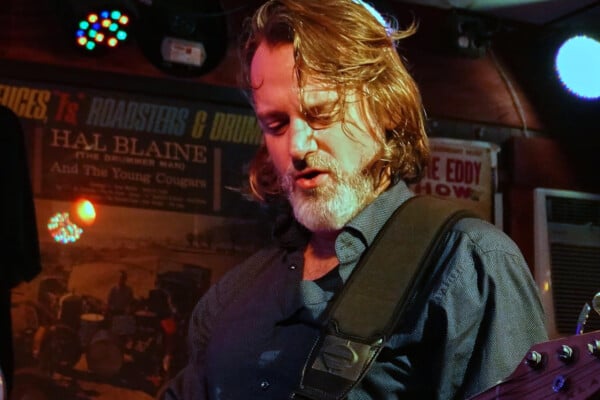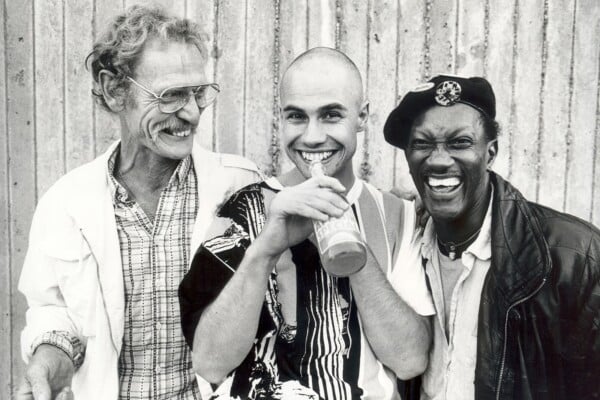Neospectric: An Interview with Max Moran
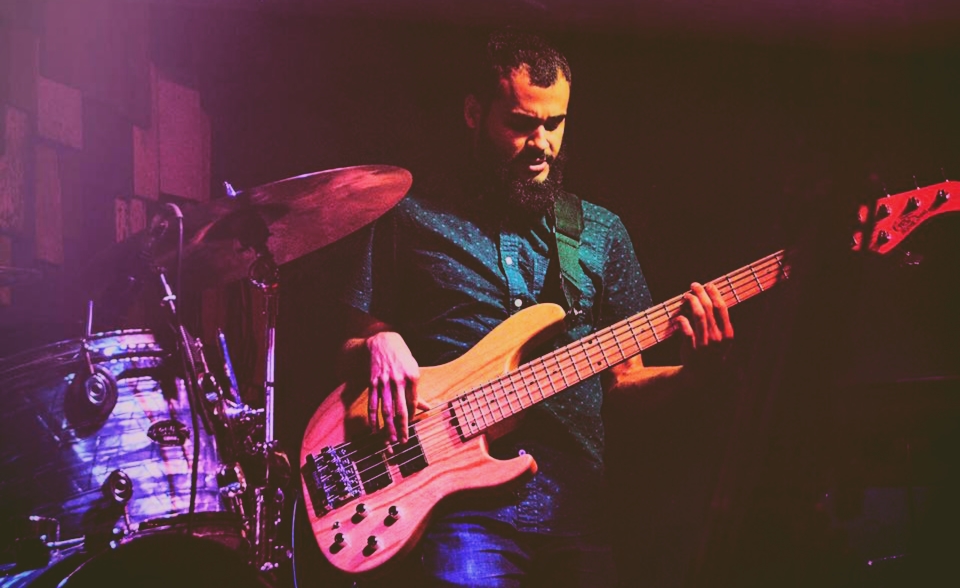
As artists, we try to combine all of our influences to create something new. Bassist Max Moran has achieved that with his new album, Neospectric. The forward-thinking jazz album, which is anchored by his band of the same name, blends styles and genres for a beautiful flow over tight grooves.
His unique sound came naturally as he forged his musical identity in sonic melting pot of New Orleans, playing with artists ranging from the Donald Harrison Quintet to The Bridge Trio to Nicholas Payton. Music is also a bit of a family tradition as his cousin is famed jazz pianist Jason Moran.
We caught up with Moran to get the scoop on his musical start, his new album, and his advice for up and coming bassists.
How did you get your musical start?
My parents wanted to make sure my siblings and I were exposed to music at a young age so we all started private lessons on piano or violin at the age of five. They chose violin for me. My father is a huge fan of all kinds of music and he also plays the accordion. My mother is not a musician but she grew up with piano lessons and learned how to read music. While I practiced violin she would stand next to me and coach me. I wasn’t particularly fond of playing the violin but I did love music. When I was ten, I began learning guitar, then electric bass at thirteen and upright bass at fifteen. In middle school, my peers and I began playing professionally at clubs and private events in New Orleans. During my senior year of high school, some of my teachers and mentors like Donald Harrison, Alvin Batiste and Michael Pellera were hiring my friends and me for gigs. I began touring with Donald Harrison internationally and was a member of his band for about eleven years.
Who were your early influences on bass?
In middle school, my jazz band teacher Dan Sumner introduced me to Charles Mingus. I fell in love with his sound, his compositions, and his bands. I was impacted by the way his music was sophisticated and complex but also visceral. Early on, I also listened to a lot of Stanley Clarke, Jaco Pastorius, Paul Chambers and Ray Brown. Not only did I like their playing, I also liked that they were band leaders as well as great sidemen. Another huge influence was my teacher, Chris Severin, who has played with Dianne Reeves, Dr. John and many others. He is one of the best bassists in the world because he has amazing technical facility on both electric and upright, a deep understanding of harmony and rhythm (he plays guitar, keys, and drums), and he is a master of many styles of music including jazz, funk and R&B.
How do you define the term “Neospectric?”
“Neo” means “new” and “spectric” has to do with seeing or vision, from the Latin word “specio.” For me it means a new way of looking at things or having a new vision or idea — always looking forward, constantly investigating different perspectives and expanding your perception.
What is your writing process like?
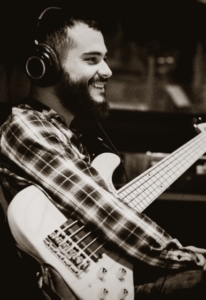 All of the songs on the album began with either a bass line, a groove, or a set of chord changes, and the melodies and lyrics were written last. I usually work out chord progressions on the bass first even if it’s just simple roots and thirds or tenths to give myself an idea of the harmony. Often, once I have some ideas I will record them in Garage Band or Pro Tools so I can hear it back. This helps me hear how the parts work together and what may need to be added or changed. Khris Royal wrote the horn melodies on “Chest” and “All Right” in the recording session after we recorded the rhythm section. For the songs with vocals, I start off singing a melody without lyrics first to feel out what notes and rhythms will work with the parts that are already there, then I come up with lyrics to the that line.
All of the songs on the album began with either a bass line, a groove, or a set of chord changes, and the melodies and lyrics were written last. I usually work out chord progressions on the bass first even if it’s just simple roots and thirds or tenths to give myself an idea of the harmony. Often, once I have some ideas I will record them in Garage Band or Pro Tools so I can hear it back. This helps me hear how the parts work together and what may need to be added or changed. Khris Royal wrote the horn melodies on “Chest” and “All Right” in the recording session after we recorded the rhythm section. For the songs with vocals, I start off singing a melody without lyrics first to feel out what notes and rhythms will work with the parts that are already there, then I come up with lyrics to the that line.
When using chords in the lower register the way you do, do you have a process for voicing them, or do you experiment?
It definitely comes from experimenting. The chords on “You Take” and “Freedom” for example just came from sitting down and playing around, following my ear and not thinking too much. Just trying to come up with progressions that are pleasing and interesting to me and evoke a certain feeling or emotion. I have to give credit to Josh Connelly, John Maestas, Cliff Hines, Shea Pierre, and Conun Pappas, the great guitarists and keyboard players in the band for voicing what they play around me without clashing. I have never told them specific voicings to play, they just listen well and play with sensitivity.
What made you choose that specific James Baldwin quote for “Freedom?” Can you tell us more about the song?
I chose that excerpt of Baldwin’s speech because I felt that what he was saying fit with the emotion of the song. When I wrote the chord progression, it sounded melancholy but also encouraging. Baldwin is speaking about a tragic and infuriating reality but he offers some hope for a solution.
In many ways I consider myself lucky to have been born in America, but it was founded on the backs of people who suffered unthinkable oppression and dehumanization. It is sad that power structures here and around the world still practice and benefit from oppression and dehumanization and it is unfortunate that Baldwin’s words from 1968 still hold such relevance today. But on the positive side, as Baldwin says, you can “look at your life, and be responsible for it, and then begin to change it.” When people hear the song and his powerful words, I would like them evaluate the state of the world today and then consider what action they can take as individuals in a positive direction.
What bass gear are you using?
The bass I am playing on the album is made by Crews Maniac Sound in Japan. Its a 24-fret, 5 string with ash body, maple neck and fingerboard. The electronics are an Aguilar OBP-3 preamp and Aguilar DCB pickups. I use an Aguilar Tone Hammer 500 head and SL112 cabinet. I also used the Mad Professor Tiny Orange Phaser on “Far Away”.
Any plans for touring with Neospectric?
We are looking forward to touring in 2019, and waiting on some dates to be confirmed. At the moment we are beginning to work on our follow-up album and exploring the possibility of touring with other bands that are friends of ours.
What advice do you have for up and coming bassists?
Practice with a metronome, practice consistently, and keep your practicing challenging and fun. Even if you only have five minutes, pick up the bass and have fun while trying to do something that is out of your comfort zone. When playing with others, try to listen to what the ensemble sounds like as a whole, not just your part. Everything you play should be with the intent of making the entire band sound good as a unit.

